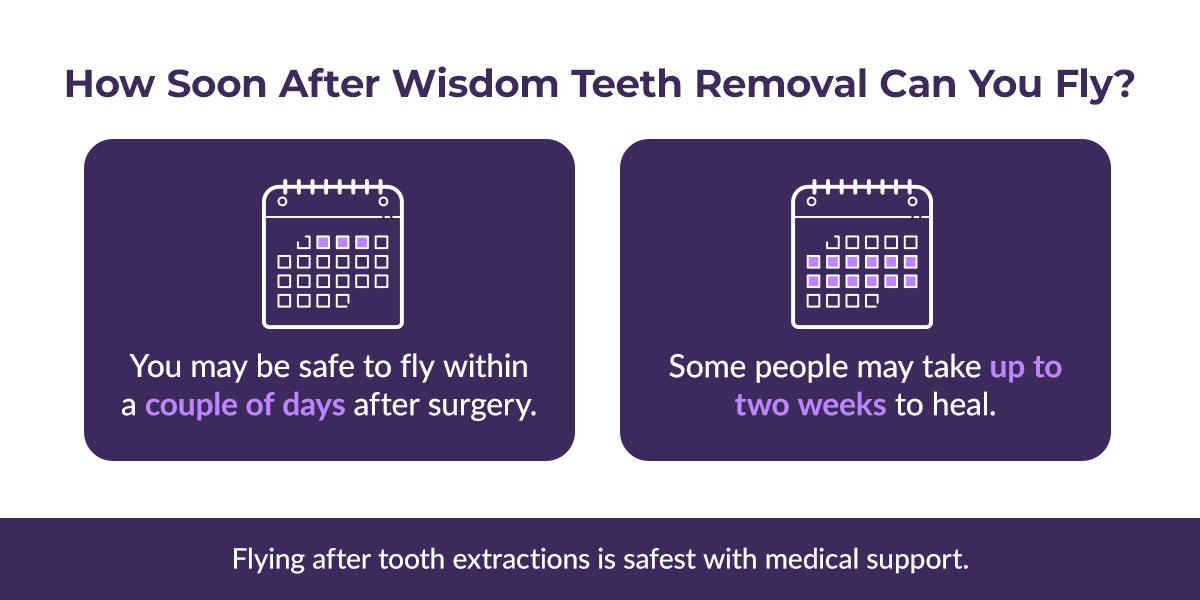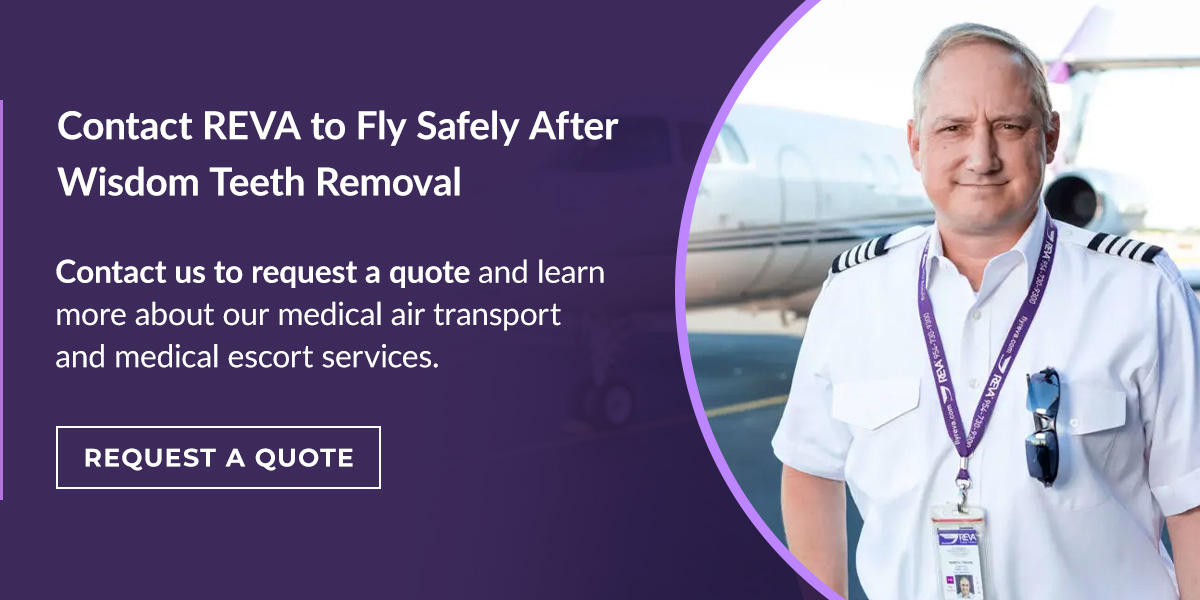You can fly after wisdom teeth removal as long as you travel with medical support. A wisdom tooth extraction takes time to heal, and a flight’s cabin pressure changes and dry air can complicate the recovery process. Flying with a medical escort or in an air ambulance can help you avoid complications like dry socket or increased pain.
Can You Fly After Having Wisdom Teeth Removed?
Flying after having wisdom teeth removed presents risks, but it’s possible with an air ambulance or medical escort. If you have an unexpected dental emergency come up shortly before a trip and require surgery, consult with your dentist after your procedure. Your provider can recommend the safest course of action based on your procedure, recovery and overall health condition.
How Long Does Healing Take After Wisdom Teeth Removal?
To understand how flying may affect you after dental surgery, it’s important to understand the healing process. The time it takes to recover from wisdom teeth removal recovery depends on factors such as age, number of teeth removed, whether a tooth is impacted and whether any surgical complications occur. The recovery process typically takes one to two weeks and occurs in the following stages.
Day 1: Blood Clot
You may experience the following symptoms for about a day after surgery:
- Bleeding
- Swelling and pain
- Mild bruising on the cheeks
- Tingling or numb sensations in your face, cheeks or mouth
- Lockjaw
A blood clot forms within 24 hours following the procedure so the socket stops bleeding. After the clot forms, granulation tissue covers the wound.
Days 2-4: Increased Swelling
You may experience increased swelling and pain for two to four days after surgery. Most providers recommend taking at least two days off of school or work to rest and returning only after your symptoms become more manageable.
You should contact your provider immediately if you experience any excessive bleeding, pain or oozing from your extraction site.
Days 5-14: Decreased Symptoms and Gradual Return to Regular Physical Activity
Five days after recovery, you should start to notice the following:
- Improved jaw mobility
- Minimal bruising, swelling and pain
- End of tingling and bleeding
- No more abnormal taste in the mouth
If you had any complications during surgery, had impacted molars or your wisdom teeth came in at an angle, you may need closer to two weeks to fully heal from surgery.
How Soon After Wisdom Teeth Removal Can You Fly?
Most providers recommend waiting until a tooth extraction site has healed before taking a flight. How soon you can fly after wisdom teeth removal primarily depends on your personal healing process. You may be safe to fly within a couple of days after surgery if it’s without complications and you heal quickly, but some people may take up to two weeks to heal.
Flying after tooth extractions is safest with medical support. If you need to fly before you are completely healed, air medical teams or a medical escort can provide care while you travel.
Risks of Flying After Wisdom Tooth Extraction
If you plan to fly after a wisdom tooth extraction, you should be aware of the following potential risks.
Dry Socket
The blood clot that forms within the first day after surgery is important for your healing process because it protects your extraction site. Dry socket is a condition that occurs when the blood clot in a tooth socket dislodges, exposing the nerves and bone underneath. The following factors can increase the risk of dry socket after surgery:
- Drinking through a straw
- Tobacco use
- Poor dental hygiene
- Birth control use
- Frequent rinsing or spitting
- Complications during tooth extraction
Flying after a tooth extraction surgery can also increase the risk of dry socket. The pressure changes during a flight can cause a blood clot to dislodge, and the aircraft cabin’s dry air can dry out the extraction site. Dry socket can cause the following symptoms:
- Visible bone in the extraction site
- Severe pain in the tooth socket
- Pain from the extraction site that spreads to the temple, eye, ear or neck
- Unusual odor or taste in the mouth
You should contact a medical professional as soon as possible if you notice signs of dry socket. Dentists typically clean an affected socket, apply a medicated paste or dressing, and prescribe antibiotics and special mouthwash to prevent infection.
Discomfort
Flying during tooth extraction recovery can also increase discomfort. The cabin’s pressure and vibrations can exacerbate pain you experience during the healing process. Considering your pain tolerance and your comfort level in the days leading up to your flight is important.
How Can You Fly After Wisdom Teeth Removal Safely?
Safe tooth extraction recovery requires special care and attention. Your dentist may instruct you to change your gauze periodically, keep the extraction site clean, apply ice to the affected area, rest, avoid strenuous activity and take pain medication.
You can safely fly after wisdom teeth removal with medical support. Consider traveling via an air ambulance or with a medical escort to increase your safety and comfort.
Air Ambulance
An air ambulance is a special aircraft designed for medical transport. Emergency air ambulances are high-quality aircraft fully equipped with medical equipment, supplies and medical professionals. When you travel via medical air transport, you fly with a highly trained medical team that provides compassionate care, medical monitoring and emergency intervention.
Medical Escort
Medical escorts are highly trained professionals who provide medical attention during commercial flights. They help you board your flight, monitor your condition, help you stay as comfortable as possible and intervene if necessary. Medical escorts also carry necessary medical supplies, so you can rest assured that you have what you need if you experience any complications.
Tips for Flying Comfortably After Wisdom Tooth Extraction
The following tips can support your recovery process and help you stay comfortable on your flight:
- Pack gauze and your prescription medications in your carry-on bag so they’re easily accessible.
- Keep a bottle of water with you.
- Use a cold compress to alleviate pain or discomfort.
- Rest during your flight.
- Avoid sticky, hard and acidic foods.
Contact REVA to Fly Safely After Wisdom Teeth Removal
When it comes to wisdom teeth and flying, your health and safety are essential. Healing after tooth extraction surgery takes some time, and flying during the recovery process comes with potential risks. A flight cabin’s air pressure changes and dry air can increase the risk of dry socket and exacerbate pain and discomfort, so flying with support is the safest way to travel.
REVA offers air ambulance flights and medical escort services for individuals who need special care during their trip. At REVA, we prioritize your safety and provide compassionate care on the way to your destination. Our flight and medical teams receive ongoing training to ensure we deliver the best care and transportation possible.
Whether you need to fly via an air ambulance or have a medical escort accompany you on a commercial flight, REVA is here for you. Contact us to request a quote and learn more about our medical air transport and medical escort services.



